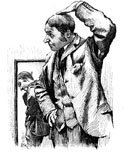
Unintelligible Profundities & Intelligible Muddles
WHY DO 'THE BEST & THE BRIGHTEST' FALL FOR THEM?
One of our most respected moralists, Alasdair MacIntyre, has lamented that there is “no rational way of securing moral agreement in our culture.” Why this moral breakdown?
One place to look for the answer is in the books of the more fashionable philosophers of the 20th century, men whose names are dropped with pride and whose sayings are quoted with respect in our institutions of higher learning, including some institutions of the Catholic persuasion.
Granted, the modern philosopher’s lot is not a happy one. Alfred North Whitehead once said that Western philosophy is all footnotes to Plato. An exaggeration, but true to this extent: Many of the interesting things were written long ago. In recent times there has been less and less room for originality.
Faced with this dilemma, many philosophers, starting about the time of Hegel in the early 19th century, have resorted to what A.O. Lovejoy calls “unintelligible profundity.” I have been working on a book that involves the intellectual history of the idea of justice, which has compelled me to read some of today’s fashionable philosophers, writers such as the German Martin Heidegger, the Frenchmen Jean-Paul Sartre and Jacques Derrida, and the Lithuanian-Frenchman Emmanuel Levinas.
You May Also Enjoy
Reviews of The Return of the Prodigal Son: A Meditation on Fathers, Brothers, and Sons... The Myth of Religious Neutrality: An Essay on the Hidden Role of Religious Belief in Theories... The Journey of Life: A Cultural History of Aging in America... Theories of Everything... Living on the Border of Disorder: How to Cope with an Addictive Person
Vengeance Is NOT Mine, Says "the Lord"... To Be Porn-Free Is to Be Second Class?... In Praise of "Coming Out" (Or: You Tell and We'll Ask)... Opposed to Abortion, But... "More Egocentric Than Theocentric"
John Paul II Reincarnate... A Third Place to Do Number 1 & Number 2... Lowlands' Lower-Case Christ... For the Love of Flipper... Past Lives for Only $90... Condom Madonna... STD-grams... Music With a Twist...

